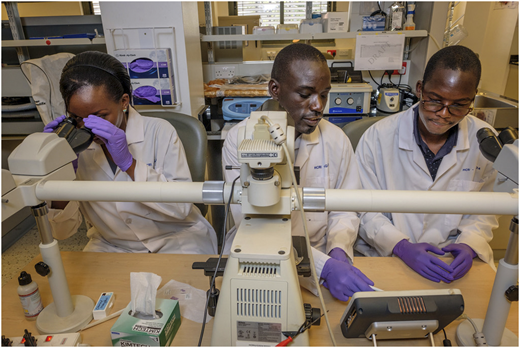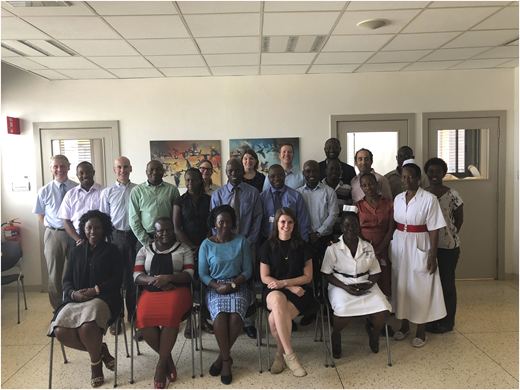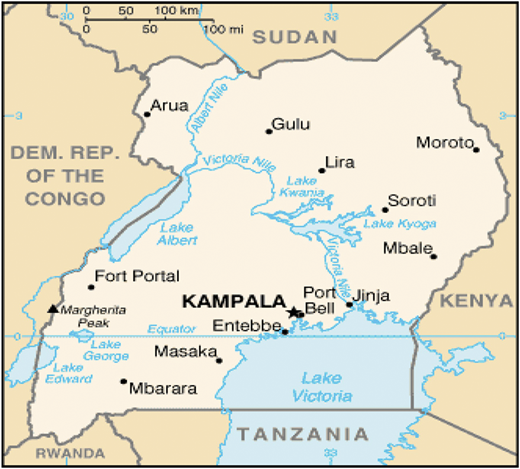Background
Uganda is an East African nation with 44 million people.
Founded in 1967, the Uganda Cancer Institute (UCI) first described and studied endemic Burkitt lymphoma.
Hematologic malignancies are the fourth most common form of cancer in East Africa after cervical cancer, breast cancer, and Kaposi sarcoma.
Epstein-Barr virus and Kaposi sarcoma herpesvirus are ubiquitous in Uganda, and they increase the risk of lymphoid cancers.
HIV seroprevalence is 6% in Uganda. Despite antiretroviral therapy, HIV remains an important risk factor in comorbidity. Twenty-nine percent of patients with cancer at the UCI had HIV in 2015, and a higher proportion was seen in patients with non-Hodgkin lymphoma.
In 2008, the UCI and the Fred Hutchinson Cancer Research Center (Fred Hutch), based in Seattle, WA, established a formal collaboration to pursue scientific cancer research and build research capacity.
Collaboration mission
Conduct high-impact research to reduce cancer-related death and suffering.
Train the next generation of Ugandan oncology and hematology leaders in cancer research and clinical care.
Build laboratory capacity for basic, translational, and clinical research.
Contribute meaningfully to the advancement of high-quality cancer care.
Hematologic malignancy objectives
Conduct studies to evaluate the pathogenesis of endemic Burkitt lymphoma and AIDS-associated lymphomas.
Improve histopathology and molecular pathology diagnostics for hematologic malignancies.
Train clinical researchers in the area of hematologic malignancies.
Methods
Mentored research
The US National Institutes of Health (NIH) International Research Training Grant D43 and US National Cancer Institute Cooperative Grant U54 have supported doctoral degree–related research in HIV-associated malignancies since 2010. The Collaboration implemented a formal peer mentorship program.
Clinical training
The US NIH Fogarty International Center has supported clinical training for UCI physicians at Fred Hutch since 2007.
In 2018, the UCI and Fred Hutch, along with Makerere University, Mulago Hospital. and the University of Washington launched an Adult Hematology Oncology Fellowship.
Investment in human capacity and infrastructure
Fred Hutch opened the UCI-Fred Hutch Cancer Centre in Kampala in 2015. The 25,000-square-foot facility features training facilities and outpatient and research facilities, including biomedical and life science laboratories.
A workforce with expertise in cancer research was developed.
Investment was made in biobanking, laboratory technology, computing, communications, and data management.
Accomplishments of the collaboration
Trained 14 long-term Ugandan physician scientists. Former fellows now serve in leadership positions at the UCI.
Awarded 2 NIH grants to fellows.
Opened a state-of-the-art histopathology lab at the UCI-Fred Hutch Cancer Centre equipped with a multi-head microscope and an Aperio digital pathology slide scanning system. Initiated expansion of immunohistochemistry capacity (Figure 1).
Trained Ugandan laboratory technicians.
Enrolled 106 participants in a study of the pathogenesis of HIV-associated lymphoma.
Since 2015, more than 200 international multidisciplinary Ugandan lymphoma tumor boards were conducted via teleconference between Kampala and Seattle, WA (Figure 2).
Introduced dried blood spot polymerase chain reaction to help diagnose and monitor chronic myeloid leukemia.
Provided comprehensive diagnosis for more than 350 patients with Burkitt lymphoma from all areas of Uganda, reduced gaps in diagnosis by ensuring funds for critical tests, filled treatment gaps, reduced nonclinical barriers to increase uptake and retention, and implemented a data monitoring system.
Map of Uganda indicating Kampala, the location of the UCI-Fred Hutch Cancer Centre.
Map of Uganda indicating Kampala, the location of the UCI-Fred Hutch Cancer Centre.
Conclusions
The UCI-Fred Hutch Collaboration is catalyzing cancer research and clinical care for hematologic malignancies.
The Collaboration is actively expanding from its historic focus on virus-associated cancers to perform research on other forms of hematologic malignancies and conduct high-impact treatment studies.
Ongoing infrastructure investments allow for correlative cancer research to be conducted in the UCI-Fred Hutch Cancer Centre’s state-of-the art laboratories in Uganda.
Authorship
Conflict-of-interest disclosure: T.S.U. received research funding from and holds patents and royalties with Celgene and has received research funding from Merck. The remaining authors have no competing financial interests to declare.
Correspondence: Clement D. Okello, Uganda Cancer Institute, Kampala, Uganda; e-mail: okdclement@gmail.com.



